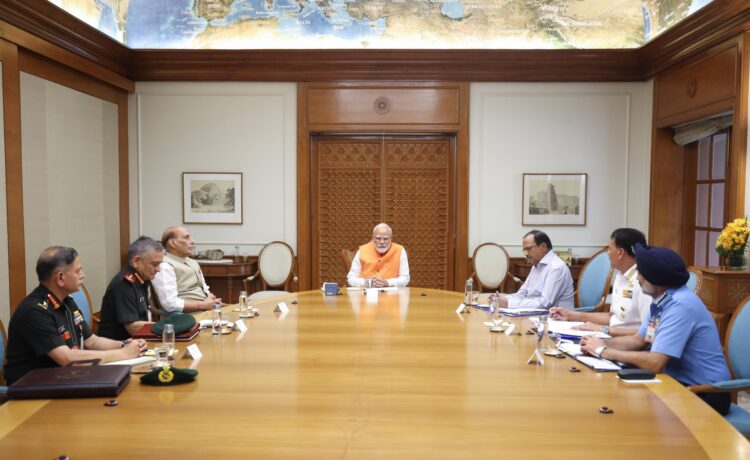KEY POINTS
- PM Modi held a top-level security meeting after the Pahalgam terror attack.
- Armed Forces given full freedom to respond.
- India suspends Indus Waters Treaty, blames Pakistan for cross-border terrorism.
Prime Minister Narendra Modi on Tuesday chaired a high-level security meeting with key defence and national security officials in the wake of the deadly terrorist attack in Pahalgam, Jammu and Kashmir, which claimed 26 lives.
The meeting, held at 7, Lok Kalyan Marg, was attended by Defence Minister Rajnath Singh, National Security Advisor (NSA) Ajit Doval, Chief of Defence Staff (CDS) General Anil Chauhan, and the three service chiefs—Army Chief General Upendra Dwivedi, Navy Chief Admiral Dinesh K Tripathi, and Air Chief Marshal Amar Preet Singh.
This meeting came just days after the Cabinet Committee on Security (CCS) convened on April 23 to assess the situation following the brutal assault on tourists by terrorists in Pahalgam. According to government sources, the Prime Minister reaffirmed that it is India’s “national resolve to deal a crushing blow to terrorism.”
Sources added that Prime Minister Modi expressed full faith in the professional capabilities of the Indian Armed Forces and assured them of his complete confidence. He also conveyed that the forces have full operational freedom to decide the mode, targets, and timing of India’s response.
On Monday, a day before this meeting, Defence Minister Rajnath Singh held a separate consultation with the Prime Minister. This followed a briefing from CDS Gen Anil Chauhan to the Defence Minister regarding key strategic decisions in response to the Pahalgam attack.
The government, in its official stance, has vowed that those responsible for the attack, including their cross-border conspirators, will face severe retribution. Officials highlighted that the CCS was briefed on clear cross-border linkages in the Pahalgam assault, indicating Pakistan-based support for the terror strike.
The attack is seen as an attempt to destabilize the region amidst the successful conduct of elections in Jammu and Kashmir and its steady progress toward economic development. In a significant diplomatic move, the Indian government has announced that the Indus Waters Treaty will be put in abeyance as part of a broader set of measures to send a stern message to Pakistan for its continued support of cross-border terrorism.
Additionally, an all-party meeting was convened in the aftermath of the Pahalgam attack. Opposition parties unanimously expressed their support for any decisive action taken by the government against the perpetrators.
The developments signal India’s firm intent to escalate its counter-terrorism stance and demonstrate a unified political front against threats to national security.

















Comments